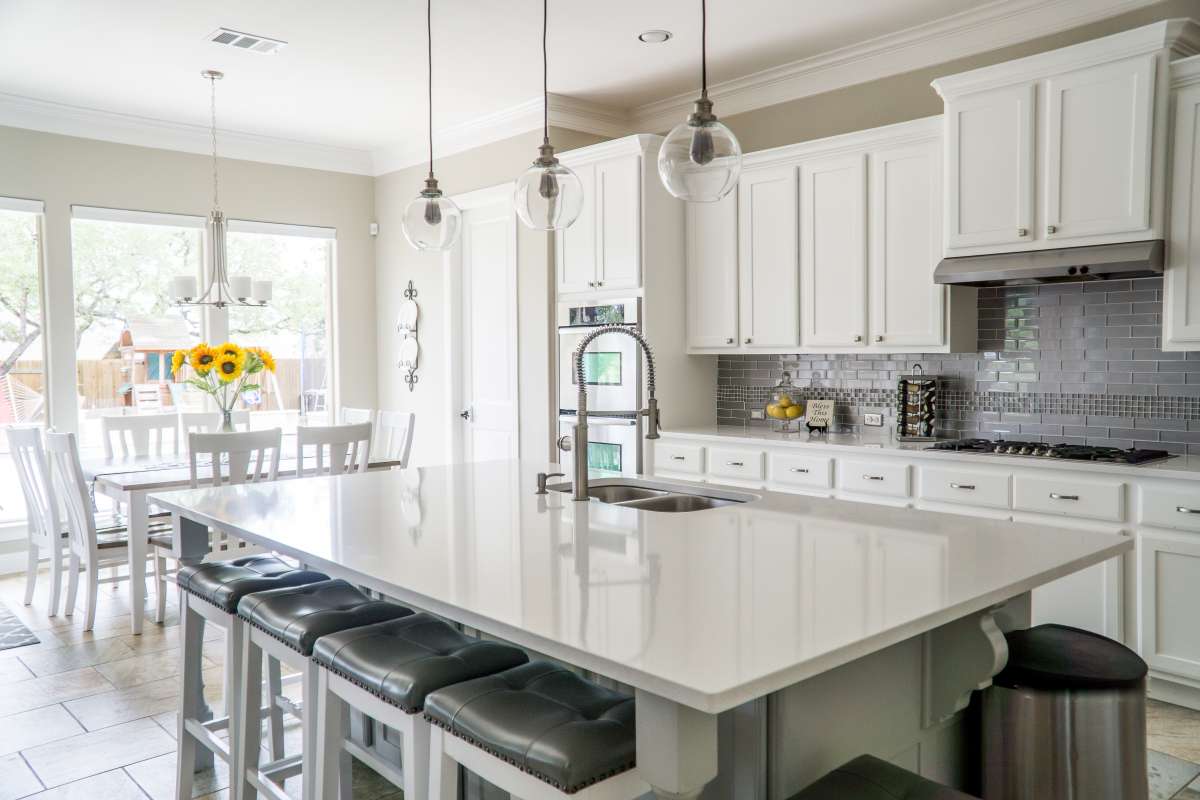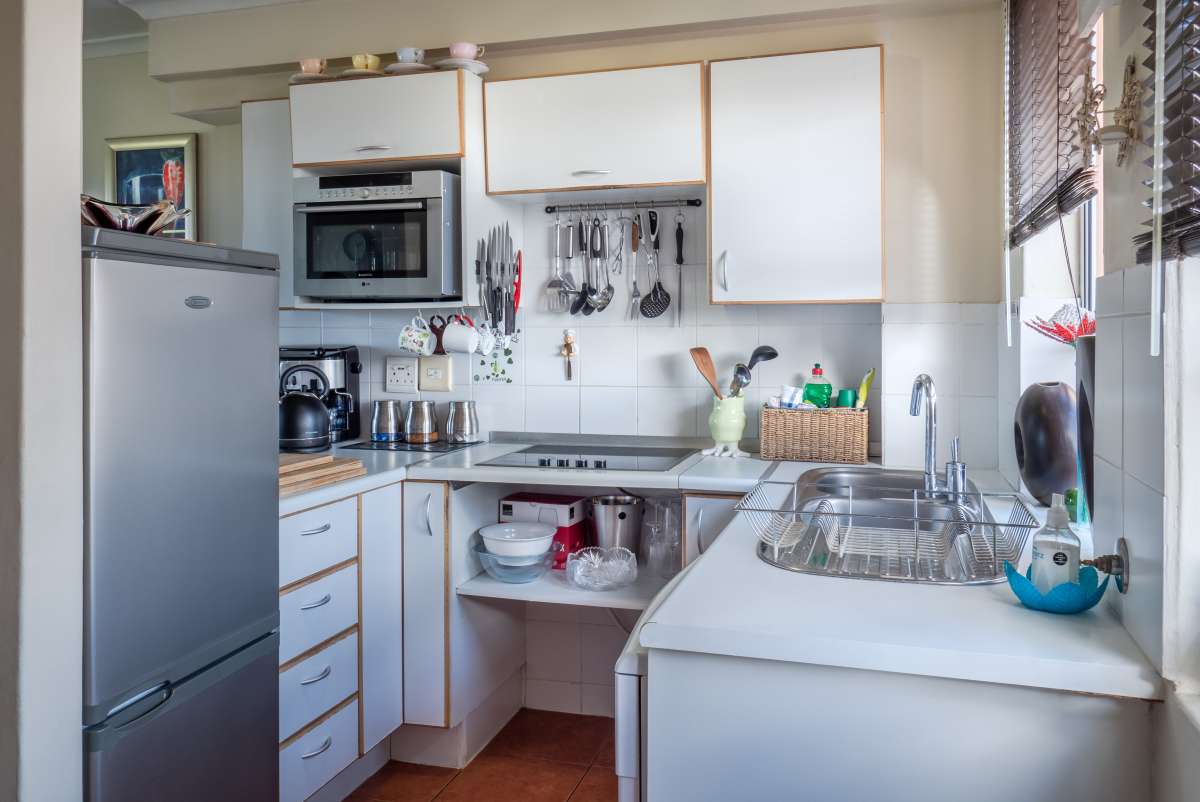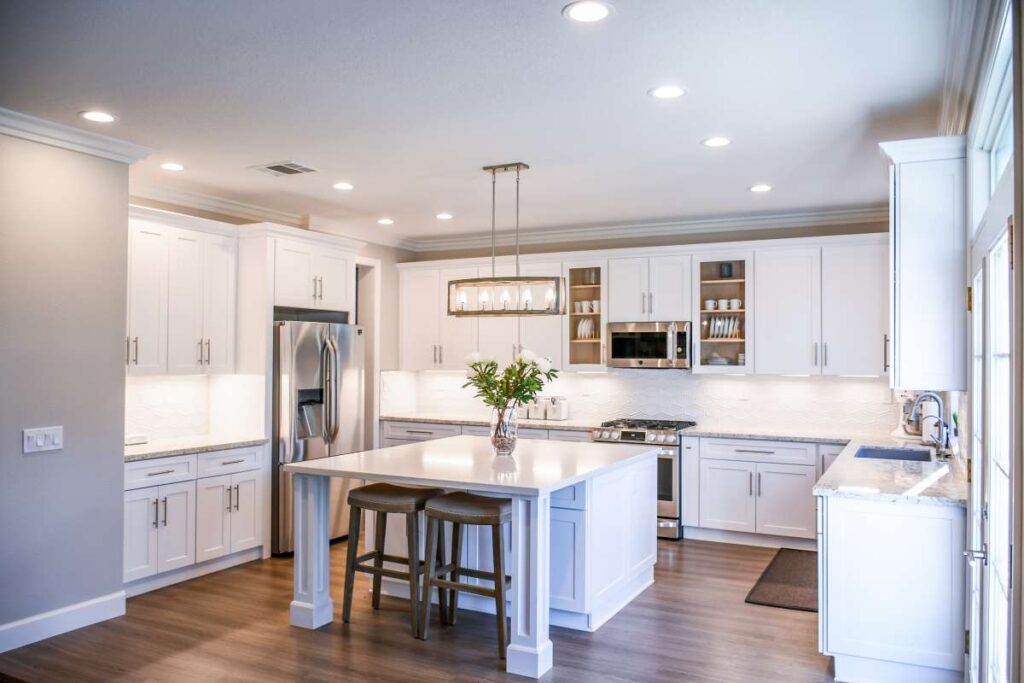A kitchen remodel is a significant project, so it's important to get it properly the first time. A new kitchen remodel, however, has the potential to rank among the most valuable investments you'll ever make in your house.
Kitchen remodels might be intimidating for individuals who have never been through one before. Researching a topic, looking for inspiration online, or trying out products in person can be exciting, but it's important to step back and assess the big picture before moving forwards. The following are a few things to think about before beginning a kitchen redesign.
Considerations For Kitchen Renovation

Consider Bringing In A Professional
A custom kitchen is a great option if you don't want yours to look generic. In order to realise your ideal kitchen, professional kitchen designers will spend time to get to know you and your preferences.
Kitchen Capital is a Perth, Western Australia company that does full kitchen remodels in a variety of different designs, from traditional & Hamptons through modern and contemporary.
Establish Your Budget
Creating a budget before beginning a kitchen remodel is the greatest way to keep from spending all of your hard-earned cash on the project.
Find out how much money you want to spend and how much of a buffer you have if you go over. In this approach, you may also seek to reduce the overall cost of the renovations.
The kitchen is among the most costly rooms to remodel, right up there with the bathroom. There are a lot of people (plumbers, electrician, cabinetmakers, etc.), supplies, and activities happening in a relatively small area.
Ten percent of the home's worth is a good rule of thumb for investments.
Kitchens are complex structures, with many moving parts.
The price of custom cabinets usually begins around around $50,000. The first step in avoiding problems in the future is being absolutely forthright about your needs and your financial capabilities.
Establish A Timetable
Set a firm deadline and budget, then stick to them. Consider how long we can without a permanent kitchen.
Do you have a deadline of four weeks for the renovations? Or maybe you could make it last for 8 instead? There is a lot to coordinate during a kitchen remodel, so be sure to plan everything out in advance to prevent scrambling in last minute.
Determine Whether You Require Any Permits.
Keep in mind that the local authorities might need to approve your upgrade plans.
If you don't have these, it'll be tough to sell or refinance your house because purchasers and lenders will still want to make sure the renovations are up to code.
Investigate The Plumbing
Think about whether or not any of the plumbing will have to be relocated before beginning any major work on the kitchen.
Even though you have an idea of where things should go, you need double check that the right pipes can indeed be moved to a right spots.
Consider Your Storage Options
Plan out the layout of your kitchen and decide where everything will go. You will probably preserve the majority of your current kitchen appliances and utensils, in addition to purchasing some new ones.
Find out how much space you need, and then look into some clever storage solutions.
Lifestyle
How would you like things to work in the kitchen? Do you plan on hosting parties in your kitchen? Do you like to work in daylight? Have you considered putting in an island?
So, what is it that is now effective for you? These are the sorts of things you and your designer should talk about before beginning work on a kitchen remodel.
Designer Of Interiors
A professional decorator will be able to provide you perspective. For example, they can assist in conceptualising the new format and assigning specifics such as where the power outlets would be placed.
They evaluate how a kitchen can be arranged in various ways to meet your requirements. Therefore, design is both practical and aesthetically pleasing.
They'll supervise the project and make sure all the little details are taken care of, like helping you choose out the materials, fixtures, and lighting.
Timeframe
Accept the truth. It won't take as little time as you watch on your favourite home improvement show (45 minutes, plus commercials).
Designer and builder leeway is guaranteed. As a rule of thumb for designers, you should always assume that the task will take more time than anticipated.
Appliances
If you can afford it, go for the finest. Built-in appliances require careful forethought and preparation.
If your kitchen doubles as a hangout spot, you might want to take advantage of the trend towards include steam ovens, constructed coffee machines, and wine refrigerators in the design.
Don't Cut Corners!
It's tempting to try to save money by reusing things like windows, pipes, and lights, but you should really allow your designer & contractor make those calls.
It could be more expensive to find a way to work around existing structures or equipment. There are occasions when trying to save money really ends up costing more in the long run.
Selecting Appliances With Caution
When shopping for new kitchen appliances, keep their resale value in mind. The re - sale value of the home could drop if you install an unusually coloured refrigerator or an unusual surface material.
Remember That Good Lighting Is Essential.
Several types of lighting should be considered if you don't want the kitchen to become too dim. Both general lighting for the entire kitchen and specific lighting for certain preparation activities (task lighting) are required.
Consider Layout Functionality
Another crucial factor to think about is how practical your kitchen arrangement is. What happens, for instance, if you try to use every drawer and appliance in your kitchen at the same time?
If you open the refrigerator door, will it block your path to the stove? Before you give the okay to the floor design, think about the remodel's layout.
Make sure there is adequate space for a kitchen island if you choose to install one. Don't forget that power outlets are essential on an island.
Is There Anything That Cannot Be Negotiated?
Think about the essentials you'll need in your new kitchen layout. The next step is to have a candid conversation with your contractor about these absolutes.
Things Nobody Tells You About Kitchen Renovation

It's (Very) Pricey.
The national average for a comprehensive, mid-range kitchen remodel is, prepare yourself, roughly $66,000, as reported by Remodeling magazine.
(What does the typical "high-end" remodel cost? Costing up to $131,000.) Cabinetry and hardware (29% of total expenses), installation (17%), and appliances & ventilation (18%) follow closely behind (14 per cent).
Strangely, though, Remodeling notes that a full-scale redesign does not guarantee increase resale value; in average, house sellers only recoup around 60% of a remodelling costs.
There should be an emphasis on smarter work rather than added complexity when updating kitchens. You can make a big difference without breaking the bank by keeping the current layout and not moving any key utilities.
Consider Who Will Attend Dinner.
The age-old "who else would we invite to the a dinner party?" is a good example. To be more precise, how often (on weekends) do you plan to arrange extravagant dinners for eight people? Or the nightly ritual of feeding infants and toddlers?
or a meal for one. What about cooking and baking? When planning a kitchen redesign, it's helpful to think ahead to how often you plan to cook and how many people will be utilising the space.
Learn the differences between such a range, cooktop, & wall oven inside the kitchen and decide which one is best for your needs with our guide.
Selecting Your Countertops Is A Combination Of Aesthetics And Functionality.
When deciding on kitchen countertops, you should also see yourself in the future. Marble and soapstone are good options if you don't mind the upkeep (and the occasional less-than-perfect appearance).
Yet, if you are trying to save money, things may be out of your price range. Get ready to find out which one suits you best! If you're in the market for new kitchen countertops, consider these five questions.
It Would Be Advantageous If You Chose A Wall-Mounted Faucet.
You could be tempted to go with a generic deck-mounted faucet without giving it any thought.
Nonetheless, mounting the sink's faucet on the wall was a bold move that made a big difference. For one, you won't have to put as much effort into maintaining a sanitary and dry environment surrounding your sink.
The Unsexy Details Of Your Project Can Make Or Break It.
Plan for sufficient ventilation (learn about Ceiling-Mounted Recessed Kitchen Vents) and outlets in addition to more visible features like tiling and countertops (see Where to Locate Electrical Outlets, Kitchen Edition).
A lovely kitchen is no good if it fills with smoke or if you have to operate the blender on the floor.
You Can Modify Your Ikea Cabinets.
Several cabinet designs are available. Don't let yourself get overwhelmed by all the options. If you're looking for a durable and stylish cabinet, there are really only six basic options to choose from.
A Double-Bowl Sink Will Put In More Effort Than A Single-Bowl Sink.
A single-bowl sink does make a smaller bathroom look and feel more streamlined. A double-bowl sink, on the other hand, allows you to separate the dishes, wash the veggies without contaminating the clean plates, and have easy access to the garbage disposal.
You Can Get A Good Deal On Used Appliances.
Like autos, the value of a new kitchen item drops as soon as it is driven off the lot. However, many homeowners & designers they know have sourced hardworking, barely used machines for a quarter of the price, and these are our prefered suppliers.
Also, how often do you shop for food before you start shopping for a refrigerator? Have you ever made a bunch of food and frozen it? Is your kitchen on the little side? For help deciding which refrigerator is right for you.
When It Arrives, Make Sure To Double-Check Everything.
Packages frequently accumulate in workplaces without being opened. Check that the colour and quality of the item you received match your expectations.
Suppliers have a habit of sending the wrong item to the duo; catching this mistake in time is crucial because employees may not realise it is the bad thing until after it has been installed.
You Might Not Require A Complete Remodel.
Keep in mind that lavish, spacious kitchens are a thing of the past (even kitchen islands are no longer necessary). Yet there are many methods to make the most out of what you have, such as painting your kitchen cabinetry or just replacing appliances or tile.
Never Pay For These Items During A Kitchen Remodel
Avoid Using Fragile Materials.
It's not always as it seems. The aesthetic value of an item is not necessarily indicative of its usefulness. Make sure to pick long-lasting components for the kitchen. Limestone, for instance, is aesthetically pleasing but is easily damaged by water rings.
Etching and staining are common problems with marble. Although countertops made of recycled glass have the appearance of modern sophistication, they are prone to chipping and cracking. If you really want the beauty without the maintenance issues, quartz is a great material choice for your remodel.
Cabinets Should Never Be Overlooked.
You may want to reduce the quantity of cabinets if you have your heart set on having a window over your kitchen sink or you're trying to achieve a Spartan design.
It's nice to think about not having a lot of stuff lying around, but where are you going to be putting your plates? Don't get rid of any cabinets during a remodel unless you absolutely have to. Find out how to improve your kitchen's layout, storage, and lighting with these suggestions.
Purchase Quality Appliances.
Whether you do it yourself or hire a professional, kitchen renovations can be expensive, but you shouldn't skimp on the quality of your appliances.
The pricey light fixture you've had your eye on might have to be sacrificed if you want to stick to your budget, but high-quality, long-lasting appliances that are also easy on the environment are far more important.
Process Should Never Be Overlooked.
It's crucial to give thought to having enough kitchen cupboards, purchasing high-quality appliances, and using long-lasting materials when redoing your kitchen. Yet, you won't get the most from your renovation unless you combine them into a functional workplace.
Ensure that traffic can easily move between the kitchen's main workstations, such as the sink, stove, and fridge. The "work triangle" is a term commonly used by kitchen designers to describe this layout.
While travelling between the fridge, the sink, and the stove, it's ideal to stroll rather than hike to keep the food preparation triangle efficient. Further information about that is provided below.
Don't Reject Professional Design Assistance.
DIY fans could be tempted to be using their expertise and initiative to handle the entire kitchen remodel on their own. That's what's meant by "doing it yourself."
DIY kitchen renovations are possible, but as anyone who's been through one knows, it's best to get some professional advise first.
If you have a rough idea of what you want to accomplish, but need help refining it, consulting an expert can help you avoid making costly mistakes. Many home improvement stores also provide no-cost in-store consultations.
Don't Forget About The Rest of Your Property.
It's simple to lose track of time while renovating your kitchen and end up neglecting the entire house. Since you'll probably be unable to use your kitchen while it's being remodelled, you'll need to create a makeshift exhibition space somewhere else in the house.
You should also take precautions to prevent the spread of dust, debris, and splatters to other areas of your home throughout the renovation. If you take the effort to keep an eye on other rooms, you may enjoy your newly renovated kitchen without worrying about any collateral damage.
Don't Forget About The Budget.
A kitchen remodel can suddenly balloon in price if complications develop. If this occurs, reevaluate your plans to determine what may be scale back on or delayed until you have more money.
If you don't want to finish resenting your expensive kitchen after the redesign is complete, it's essential that you adhere to your initial budget.
Appliances Should Not Be Chosen Last.
Putting off appliance selection till the end of a kitchen remodel is a common mistake. While it's tempting to go right into arranging cabinets and counters, remember to factor in the size requirements of your major appliances.
If you get cabinetry and then measure and discover that your oven is only 24 inches wide, you will be very dissatisfied.
Remember To Have Fun.
Any renovation project would benefit from a healthy dose of humour and levity. Keep in mind that the goal of your kitchen renovation is to increase your joy, so try to relax your guard and brush off any blunders as best you can.
Don't be afraid to show off your imaginative side. Create the space that isn't too serious by installing a colourful backsplash or experimenting with a kitchen island made of different materials.
Don't Let The Project Destroy Your Relationships.
Business Insider reports that a depressing 12% of married couples seriously discuss divorce during home improvement projects. One attorney even said that home improvement projects were more often the cause of divorces than adultery. Whether or not that holds true, we must never forget that individuals come first.
FAQS About Home Kitchen
Optimal lighting, ventilation, storage, bench space, durable materials and room to move should all be considerations when planning your kitchen. To make the most of your kitchen reno, you don't want to choose materials or a colour scheme that will date after only a few years, so be clever about the style you choose.
- Tip #1: Always Put Functionality First Before Decor.
- Tip #2: Integrate Smart Storage Solutions.
- Tip #3: Go All Out With the Countertop Space.
- Layout.
- Storage.
- Lighting.
- Flooring.
- Ventilation.
Dirty hands are a breeding ground for germs and bacteria. Make sure you wash your hands prior to cooking. Never rush when preparing any meal as under-cooked food can contain bacteria that can lead to indigestion and eventually food poisoning.
One of the hardest parts of a kitchen remodel project is making sure all the cabinets are in the right place, so they blend in with the existing woodwork. This is especially important when you are doing a whole kitchen revamp, so it is vital to keep your installation plan organised.

